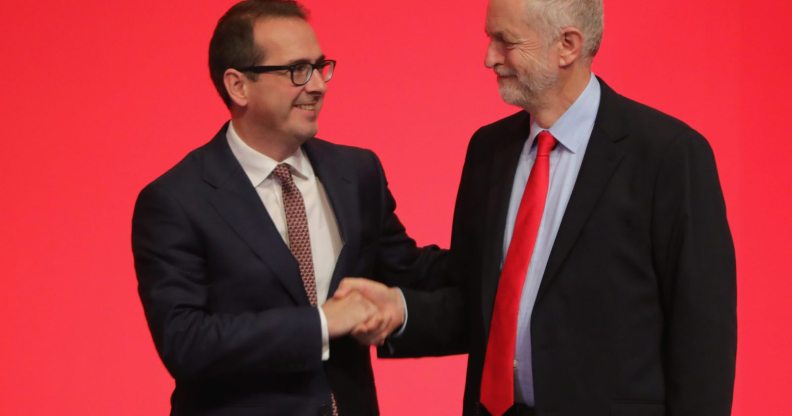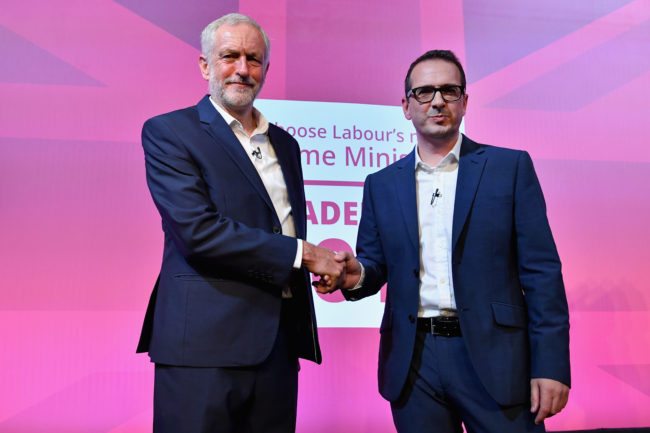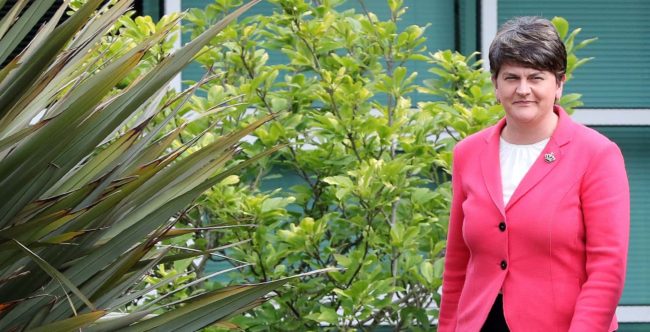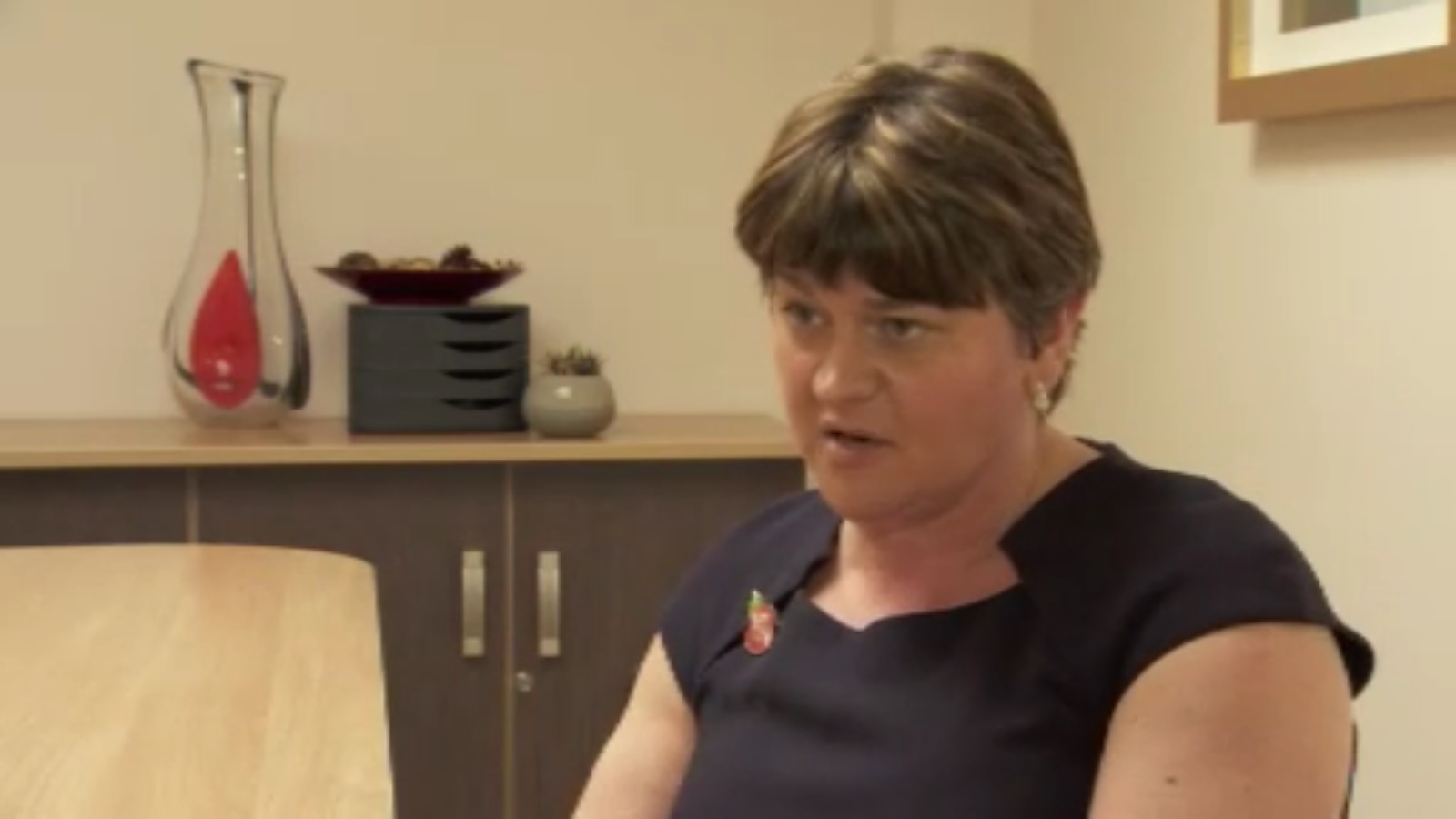Labour may back equal marriage referendum for Northern Ireland

LIVERPOOL, ENGLAND – SEPTEMBER 24: Jeremy Corbyn MP (R) shakes hands with Owen Smith MP as they arrive to hear the result fpor the new the leader of the Labour Party, on the eve of the party’s annual conference at the ACC on September 24, 2016 in Liverpool, England. The leadership battle between Jeremy Corbyn and MP for Pontypridd Owen Smith, was triggered by Labour MPs who were unhappy with Mr Corbyn’s leadership in the run up to the Brexit referendum. (Photo by Christopher Furlong/Getty Images)
The Labour Party may support proposals for a referendum on equal marriage in Northern Ireland.
Northern Ireland is the only part of the UK without equal marriage, despite majority support among the country’s population and among the politicians that make up its regional Assembly.
The ultra-conservative Democratic Unionist Party strongly opposes the implementation of same-sex marriage, and its stance has been a key bone of contention in coalition talks with Irish republican party Sinn Féin.
The country has been without a regional government since January due to the failure of power-sharing talks between Sinn Fein and the DUP, who legally must form an executive as the two largest parties.
The UK’s Conservative government has so far resisted pleas to intervene to help secure marriage equality.
However, the Labour Party is reportedly planning to throw its support behind a referendum in the region.

Jeremy Corbyn and Owen Smith (Photo by Jeff J Mitchell/Getty Images)
According to The Times, Jeremy Corbyn’s Shadow Northern Ireland Secretary Owen Smith is in favour putting equal marriage and abortion rights to a referendum if power-sharing is not restored.
Polling suggests that there is overwhelming support for same-sex marriage in the region, and when a referendum was held in the Republican of Ireland in 2015, 62% backed the change.
Sinn Féin has included equal marriage in a list of demands that need to be met before it will agree to the restoration of power-sharing in Northern Ireland..
Sinn Féin’s Michelle O’Neill has previously criticised both the DUP and the UK government for failing to meet its demands.
In a previous statement she said: “Over the last ten months, the focus of these negotiations has been on the delivery of rights which are the norm everywhere else on these islands.
“Many of these rights are fundamental parts of the Good Friday and other agreements. They are for the benefit of all sections of society and threaten no-one.
“Furthermore, marriage equality, language rights, the Bill of Rights and the right to Coroners Inquests are supported by a majority in the Assembly and in wider society.
“The only reason they are denied is because of DUP resistance to the rights agenda and the British Government’s acquiescence in this.”
She added: “The issue of rights is not going to go away. The DUP and British Government know this. These rights must be satisfactorily dealt with.

(Photo by PAUL FAITH/AFP/Getty Images)
“Sinn Féin is disappointed that the last few weeks of negotiations have ended in failure. We did our best to be flexible and we were prepared to stretch ourselves in the common good.”
She added: “I want to state explicitly that, in the context of agreement on delivery of these rights, Sinn Féin will re-enter government. In the absence of these rights the Executive is not sustainable.”
However, the DUP statement accused Sinn Féin of following a “narrow political agenda” with its demands.
Gregory Campbell MP of the DUP, who once described homosexuality as ‘evil’ and claimed God sent AIDS as a homosexual ‘curse’, attacked Sinn Féin’s “shopping list”.
He said: “SF collapsed our devolved government over ten months ago. They then produced a shopping list of preconditions before they would re-establish an Executive.
“For ten months, SF has blocked key decisions being taken about Northern Ireland’s infrastructure development and reforms in our health and education services.
“For SF to then complain about the speed of progress, is nothing short of rank hypocrisy.”
“The DUP stands ready to form an Executive today. We want devolution. Arlene Foster has led our Talks team and is rightly frustrated that government is being held back by a narrow political agenda.”
LGBT activists have previously called for equal marriage to be imposed from Westminster.
But the UK government’s Secretary of State for Northern Ireland, Rt Hon James Brokenshire MP, said that the decision to legislate for a budget did not mean “direct rule”.
Mr Brokenshire said: “While important progress has been made in discussions between the DUP and Sinn Fein towards the establishment of an Executive, it has not yet been possible for the parties to reach agreement.
“I am taking forward the necessary steps that would enable a Budget Bill to be introduced at Westminster at the appropriate moment in order to protect the delivery of public services in Northern Ireland.”
He added: “I also want to be clear that passing a Budget in Westminster does not mean a move to direct rule.
“Let me be clear, this is not a barrier to continued political negotiations and the Government will continue to work with the Parties with that intent.”

He added: “The Government remains steadfast in our commitment to the 1998 Belfast Agreement and its successors and to the institutions that they establish.
“I therefore urge the parties to resolve their outstanding differences to see the restoration of devolved government quickly.
“Together with the Irish government, in accordance with the three stranded approach, we will continue to work with them and support them in their efforts.
“But in the end it is only the parties themselves that can reach that agreement.
“It remains firmly in the interests of Northern Ireland to see devolved government restored, to see locally elected politicians making decisions for the people of Northern Ireland.
“With goodwill and compromise on all sides the parties can still achieve this and it is what needs to happen.”
LGBT activists say that the only way to secure equal marriage in the region without the Assembly functioning is for the UK government to directly intervene.
Speaking after the judgment, Director of The Rainbow Project John O’Doherty said: “Of course, we would prefer that the Northern Ireland Assembly were in a position to grant these rights; the Assembly is not currently functioning.
“It is, therefore, the responsibility of Theresa May’s government to make the necessary amendments to the marriage legislation to make it applicable in Northern Ireland.
“The eyes of LGBT people around the world will now be on Theresa May. She says that she has changed her mind on LGBT equality over her years in Parliament. Now is her chance to prove it.”
Clare Moore of Love Equality concurred: “During this period of political instability it is now imperative that the Westminster government takes immediate action to ensure that the rights of LGBT people in United Kingdom are available for all UK citizens.”
UK Prime Minister Theresa May recently expressed her personal support for same-sex marriage, in an exclusive column for PinkNews.
Writing for PinkNews, Mrs May affirmed: “I want all British citizens to enjoy the fullest freedoms and protections. That includes equal marriage – because marriage should be for everyone, regardless of their sexuality.
“And while that is a matter for the devolved government of Northern Ireland, I will continue to make my position clear – that LGBT+ people in Northern Ireland should have the same rights as people across the rest of the UK.”
Given the continued failure of power-sharing talks in the country it is unclear whether Mrs May would go as far as to impose the issue via direct rule.
Any such decision would likely imperil her confidence and supply deal with the Democratic Unionist Party, which is crucial to keeping the Conservative government afloat in Westminster.
The leader of the Democratic Unionist Party Arlene Foster recently vowed to keep blocking equal marriage.
She defended her actions by insisting gay people don’t really want to get married anyway.
Ms Foster said: “This suggestion that every single person who’s a homosexual wants to change the definition of marriage is actually wrong.
“I know plenty of people in that community who don’t want to see marriage redefined and are quite content to live in partnership… it’s all become a bit of a storm in a teacup.”
Foster has also branded the campaign for equal marriage “toxic” – for suggesting she has homophobic views.
She said: “[The] most frustrating thing about this whole debate is the fact that if you stand up for marriage and if you stand up for the definition of marriage as we believe in it, then in some way that makes you homophobic and a hater of gays.
“Nothing could be further from the truth as far as I personally am concerned and it really does hurt me when people call me a homophobe just because I stand up for the definition of marriage which I believe in and I think this debate has become very toxic.”
A senior DUP minister previously branded LGBT Pride events “totally repugnant”.

